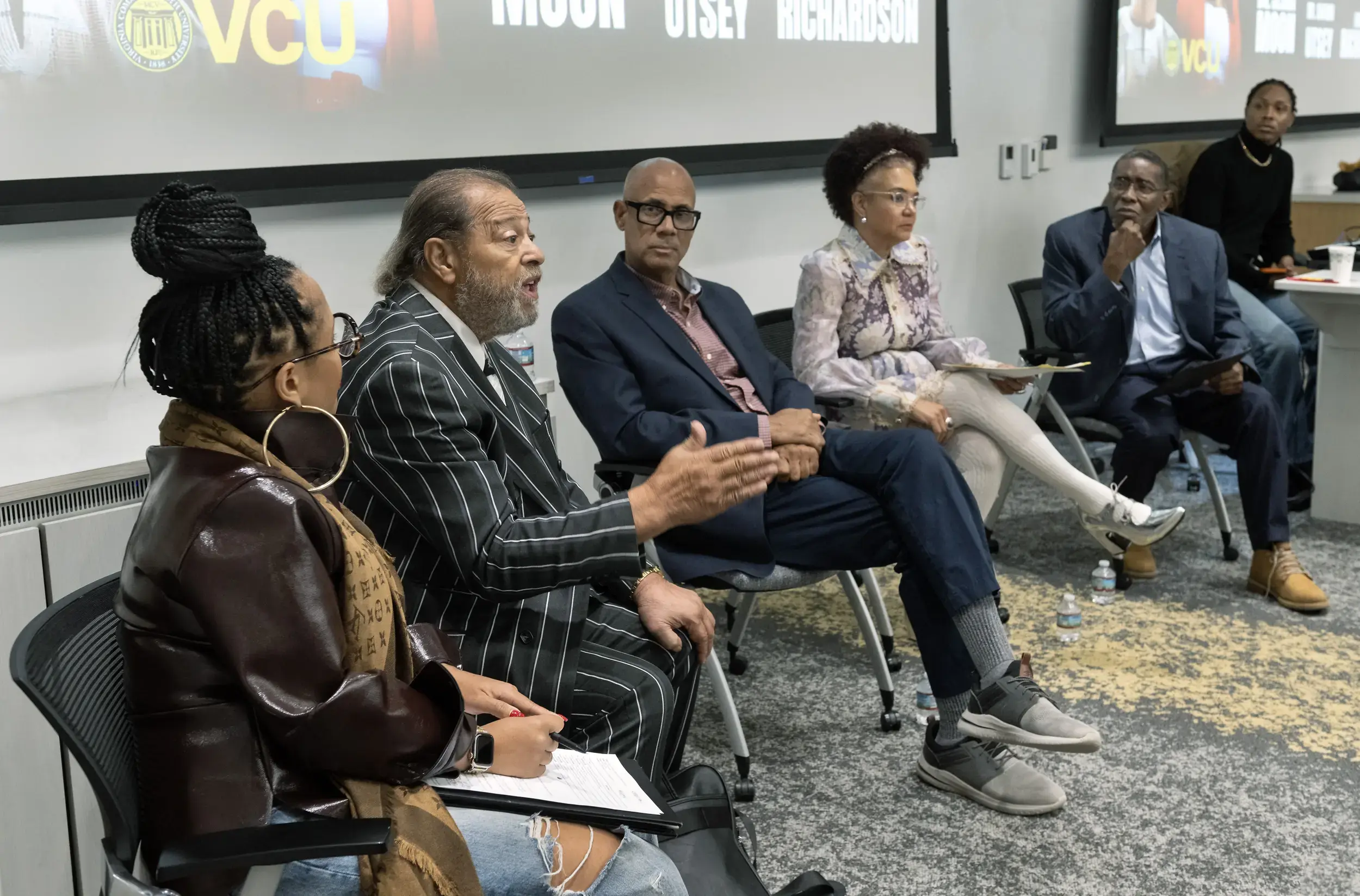The intersection of DEI and restorative justice – and the lenses through which they are viewed – propelled a public discussion last week at Virginia Commonwealth University, with three panelists offering broad but direct perspective on one of America’s essential challenges.
“Restoration and DEI: Where are We Now?” took a fresh pulse of how diversity, equity, inclusion and other reparative initiatives are framing modern affairs. The panelists – Sesha Joi Moon, Ph.D., executive director of the JXN Project; Shawn Utsey, Ph.D., a professor in VCU’s Department of Psychology; and Chuck Richardson, a former Richmond City Council member – brought personal insights to their assessment of efforts to address racial injustice and healing.
Moon, who served as chief diversity officer of the U.S. House of Representatives, ties her DEI work to constitutional principles and considers discrimination overall, whether based on race or other factors.
“We have to be shrewd enough to devise different strategies to approach different problems, even though they emanate from the same fundamental mistake,” said Moon, who earned degrees in criminal justice and African American studies at VCU.
That dehumanizing legacy of slavery is central to Richardson, who was a fixture of city government for decades and a prominent figure in its evolution amid racial turbulence.
“That’s what all of this is about – the failure of a moral nation, predicated on not acknowledging that they were wrong,” Richardson said. “That is the biggest sin of this country today.”
Utsey noted that the damage of taught racism and cumulative injustice is deep, with white advantage and Black disadvantage transmitted across generations – as reflected in the state General Assembly’s refusal to apologize for slavery.
“We have to begin to peel back some of the language, keep it plain and address the priorities of how do we not only restore the integrity or the humanity of Black people but how do we prevent the continuation of the crimes that are simply an extension of slavery and Jim Crow segregation, but in a different form,” he said. Amid such obstacles, “we really can’t talk about reconciliation.”
“Restoration and DEI: Where are We Now?” was hosted in the STEM Building by Project Gabriel, which VCU established in spring 2023 to report, reconcile and heal the wounds caused by the university’s historic ties to slavery. The event was held in collaboration with the VCU Common Book program, whose featured work this year, the podcast series “Memory Wars,” also deals with memory and memorialization around brutal histories.

Stephanie Rizzi, Project Gabriel director, and anthropology professor Christopher A. Brooks, Ph.D., of VCU’s School of World Studies moderated the panel, whose members emphasized how history is casting a long shadow.
Utsey described his upbringing in New York by parents who were from North and South Carolina and experienced the civil rights struggle. “They transmitted their understanding of the world, their mistrust,” he said. “They taught me how to navigate environments in which I wasn’t welcome.”
Utsey noted that beyond the legitimacy of reparations for Black Americans whose ancestors helped build the country, the issue itself “has been the burden of Black folk in this country – always reminding people what is the right thing to do.”
Richardson, a Vietnam veteran, recalled the entrenched resistance to change during his time in public office starting in the 1970s. As for reparations, in terms of the true value of uncompensated Black labor in American history, “we couldn’t solve it with the entire deficit of this country. It’s trillions of dollars,” he said.
“In the context of a spiritual reparations, where you see the honesty of true dignity, of a human being regretting what they did, expressing and asking forgiveness, that would be enough reparation for me, because once they do that, all those other problems are going to start to evaporate,” Richardson added. “The world has to regain its morality. That is the only thing that will ever heal this country – if we get some kind of moral rearmament.”
Moon shared how developing the JXN Project, which redefines Richmond’s historic Jackson Ward neighborhood around its true Black history, has shaped her considerations.
“Reparations for me looks like creating policies that make sure that before we convert this building from a gym to the STEM Building, that we do an archeological analysis to make sure this isn't a sacred space of our ancestors,” she said. “So for me, reparations can take on multiple layers beyond just money.”
The panelists also warned about moves to remove Black history courses and DEI efforts from schools, which would perpetuate the minimizing of Black contributions and suffering in America. And they agreed that election results could dramatically affect policy and rhetorical landscapes in upcoming years.
In his immediate setting, Utsey wants VCU to act ethically in its academic and medical practices, and in its commitment to rectifying history. He also wants to play a role in progress.
“Reaching back to community and pulling others up, that is the biggest impact I could make. This is not only asking for money but using your resources, your platform, your privilege to make opportunities for others. That’s reparations,” Utsey said. “I’m not waiting around for that check. I expect it, but I’m not waiting for it to do my part in trying to facilitate this reappropriation.”
